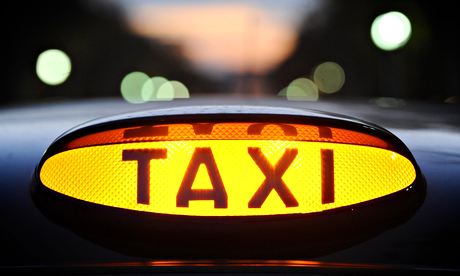
Every digital entrepreneur dreams of inventing a disruptive technology. But perhaps in the case of Uber, a California company that now operates in 110 cities around the world, including London and Manchester, things may have gone too far. If Transport for London (TfL) doesn’t do something about it soon, says the Licensed Taxi Drivers Association (LTDA), a mass protest from London’s cabbies will bring gridlock to the city centre next month.
The idea behind Uber, and its rivals, is simple. When you need a taxi you look at its app, which shows you all the cars nearby and how quickly one could reach you. You press a button, a car comes, and the payment is taken from your card automatically. Rates are about the same as normal taxis (or more expensive, if you choose a luxury car). The advantage is that you don’t have to wave forlornly on the street, or queue at a rank, and the whole thing feels cool as hell.
The cabbies’ beef is also simple. They claim that Uber is a taxi company. What’s that? You thought it was a taxi company too? Oh dear me no. As uber.com explains, its business is “connecting riders to drivers”. The cars come in several standard types, but Uber don’t own them. The drivers are approved by Uber, and supplied with equipment by Uber, but they are self-employed. In order to apply to drive for it – sorry, partner with it – the first thing you have to do is say you understand that Uber is “not a transportation carrier”. It’s like eBay, or Silk Road for that matter: a shop that doesn’t sell anything.
This distinction is important because it helps to keep Uber away from laws that license taxis. In the case of London, cars with taxi meters are considered taxis, but TfL says that Uber’s time-and-distance-measuring machines aren’t taxi meters, because they are not physically connected to the cars. The cabbies, for their part, call this bunkum, and claim that TfL are just frightened of Uber’s fancy lawyers. And the cabbies are not alone. Uber is also facing, or has faced, bans, restrictions, court cases or protests of some kind in Brussels, Paris, Berlin, Houston, Portland, New Orleans, Seattle, Miami, New York, San Francisco, Chicago, Washington DC, Vancouver and Toronto. In Paris, naturally, an Uber car was even physically attacked.
“I anticipate that the demonstration … will attract many, many thousands of cabs and cause severe chaos, congestion and confusion across the metropolis,” says the LTDA’s general secretary Steve McNamara. It is tempting to ask how anyone will tell.





